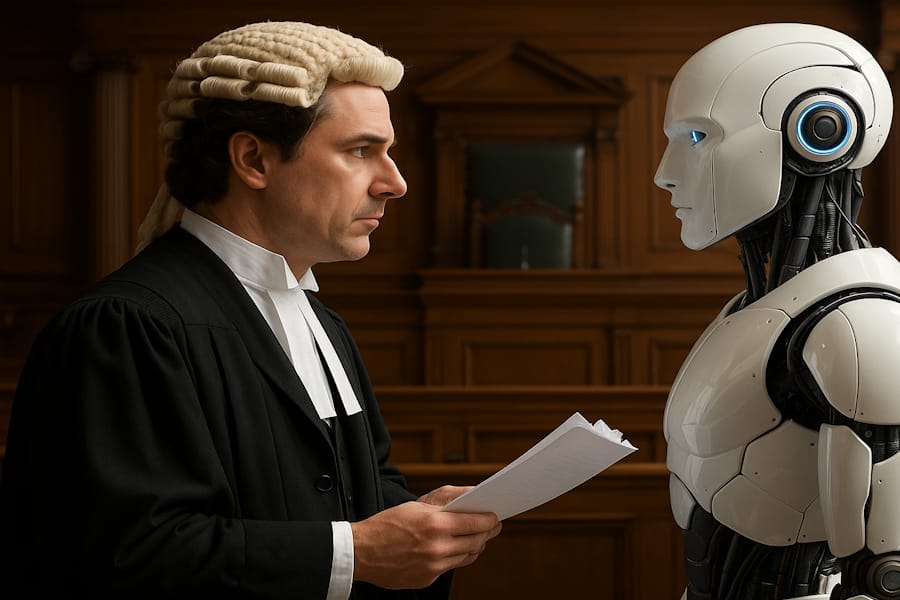⚖️ Barristers vs. GPT
How AI Is Disrupting UK Courts

Publish Date: Last Updated: 30th June 2025
Author: nick smith- With the help of CHATGPT
Fake case law, ethical dilemmas, and the need for regulation—AI is on trial in the UK legal system.
The Verdict So Far? “Proceed with Caution.”
The UK’s Bar Council has issued fresh guidance to barristers warning against the uncritical use of generative AI—particularly large language models (LLMs) like GPT-4—in court proceedings.
This comes after several high-profile cases in the US and globally where AI tools generated fictional case citations, incorrect precedents, and misleading summaries—leading to public embarrassment and judicial delays.
While there’s no confirmed UK legal disaster yet, the risks are very real.
📚 The Problem: “Hallucinations” in the Courtroom
LLMs are known for hallucinating facts—confidently presenting false information that appears authoritative. In legal contexts, that can mean:
- Citations to non-existent rulings
- Misquoting or misinterpreting established case law
- Generating arguments that subtly distort precedent
For a justice system based on accuracy, precedent, and evidence, even one mistake can be catastrophic.
The Bar Council Responds
In its June 2025 announcement, the Bar Council outlined key warnings for legal professionals:
- Do not treat LLM outputs as legally reliable.
- All references must be verified using official legal sources.
- AI tools must not breach client confidentiality (many public tools store prompts).
- Barristers are personally accountable for AI errors used in submissions.
“These tools can assist with brainstorming—but they are not a substitute for legal judgement,” said the Council’s Technology and Ethics Working Group.
So What Can AI Be Used For?
AI still has valid, responsible use cases in legal practice:
- Drafting skeleton arguments or templates (under human review)
- Brainstorming angles for litigation strategy
- Translating or summarising complex documentation
- Research starting points (never endpoints)
Firms using private LLMs trained on UK case law—such as Harvey AI or Lexis+ AI—may mitigate risk, but the responsibility still lies with the human advocate.
GPT in the Dock: A Global Trend
In 2023, a New York lawyer famously cited entirely fictitious cases produced by ChatGPT—only realising the error after judicial questioning. Similar cases have occurred in Australia and Canada, igniting global concern.
UK courts have so far avoided this fate, but the increasing availability and pressure to “speed up” legal work may change that quickly.
The Ethical Dilemma
Beyond accuracy, deeper questions persist:
- Could AI undermine the human intuition critical to advocacy?
- Will junior barristers become over-reliant on tools they don’t fully understand?
- If AI makes justice faster, does it also risk making it more opaque?
As one senior judge put it:
“Justice must not only be done—it must be seen to be done by a human mind, not a machine.”
Final Judgement: AI Must Be the Clerk, Not the Judge
Generative AI will undoubtedly shape the future of UK legal services—but that future must be grounded in ethics, training, and responsibility.
This is a critical reminder that AI is a tool—not a truth machine. It exists to support the development of work, not replace the diligence behind it.
When used in law—or any domain involving high-stakes decisions—the responsibility lies with the human. The issue isn’t that AI makes mistakes. The issue is when users fail to verify what it produces.
AI has done the legwork. That should free people up to do their own fact-checking—not excuse them from it.
Blaming the tool for poor outcomes is like blaming a calculator for bad maths. It’s not AI that’s lazy—it’s the person using it irresponsibly.
In the courtroom, AI should remain the clerk—not the judge, jury, or executioner.
Latest AI News Articles
AI Questions and Answers section for Barristers vs. GPT How AI Is Disrupting UK Courts
Welcome to a new feature where you can interact with our AI called Jeannie. You can ask her anything relating to this article. If this feature is available, you should see a small genie lamp above this text. Click on the lamp to start a chat or view the following questions that Jeannie has answered relating to Barristers vs. GPT How AI Is Disrupting UK Courts.
Be the first to ask our Jeannie AI a question about this article
Look for the gold latern at the bottom right of your screen and click on it to enable Jeannie AI Chat.




